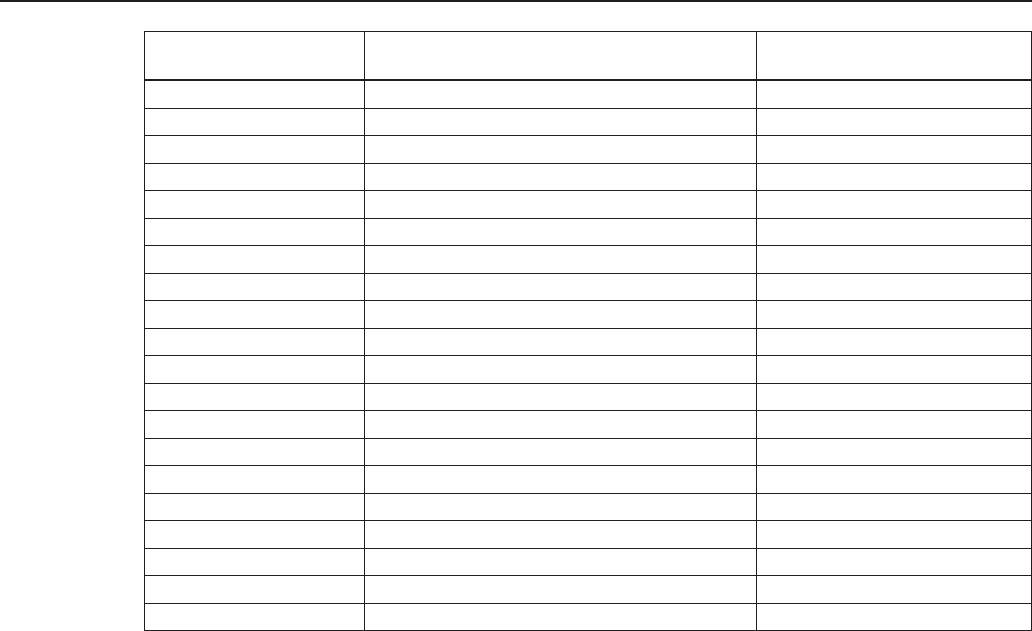
1594A/1595A Super-Thermometer
Interface Commands
74
Command Function
Associated Setting or
Function (screen)
SYST:PASS:GROU:RES Sets the password Resistor Protection setting Resistor Protection (Password)
SYST:PASS:GROU:TIME Sets the password Time/Date Protection setting Time/Date Protection (Password)
SYST:PASS:NEW Changes the password Password (Password)
SYST:PON:MIN? Reads the time in minutes since power-on
SYST:TIME Sets the Time of the system clock Time (Time and Date)
SYST:TIME:DAYL Sets the Daylight Saving automatic adjust setting Daylight Saving (Time and Date)
TEST:CURR:CONF Sets the conguration of the sensing current test CURRENT TEST (Calibration)
TEST:CURR[:STAT] Starts or stops the sensing current test CURRENT TEST (Calibration)
TEST:LIN:ABOR Cancels a linearity self-test LINEARITY TEST (Calibration)
TEST:LIN:INIT Starts linearity calibration LINEARITY TEST (Calibration)
TEST:LIN:PAR? Reads the suggested linearity calibration parameters LINEARITY TEST (Calibration)
TEST:LIN:REP<n>? Reads the linearity self-test report LINEARITY TEST (Calibration)
TEST:LIN:STAT? Reads the state of the linearity self-test LINEARITY TEST (Calibration)
TEST:LIN:TIME? Reads the time remaining of the linearity self-test LINEARITY TEST (Calibration)
TEST:LIN:TOL<n>? Reads a linearity calibration error tolerance LINEARITY TEST (Calibration)
TEST:SYST:ABOR Cancel a system self-test SYSTEM TEST (Calibration)
TEST:SYST:INIT Initiate a system self-test SYSTEM TEST (Calibration)
TEST:SYST:REP<n>? Reads the report from a system self-test SYSTEM TEST (Calibration)
TEST:SYST:STAT? Read the completion state of the system self-test SYSTEM TEST (Calibration)
UNIT:TEMP Set the temperature Unit Unit (Temperature Unit)
8.7.3 Descriptions of Commands
The function of each command as well as an example of each is listed below.
8.7.3.1 *CLS
Clears all status registers and the error queue. Specically, this command clears the Standard Event Status
Register (see Section 8.7.3.3, *ESR?, on page 74), Operation Status Event Register (see Section 8.7.3.89,
STAT:OPER?, on page 94), Questionable Status Event Register (see Section 8.7.3.92, STAT:QUES?, on
page 94), and system error queue (see Section 8.7.3.116, SYST:ERR?, on page 98). The Status Byte Reg-
ister (see Section 8.7.3.7, *STB?, on page 76) is updated to show the new state of the registers.
8.7.3.2 *ESE <value>
Example command: *ESE 16
Query form: *ESE?
Sets the Standard Event Status Enable Register. This mask register determines which corresponding bits of the
Standard Event Status Register (see Section 8.7.3.3, *ESR?, on page 74) affect the ESB summary message
(bit 5) of the Status Byte Register.
8.7.3.3 *ESR?
Example response: 160
Reads and clears the Standard Event Status Register. This indicates any of several events dened by the IEEE-
488.2 standard and which are listed in the following table. Reading the Standard Event Status Register clears
it. The register is also cleared by the *CLS command.


















